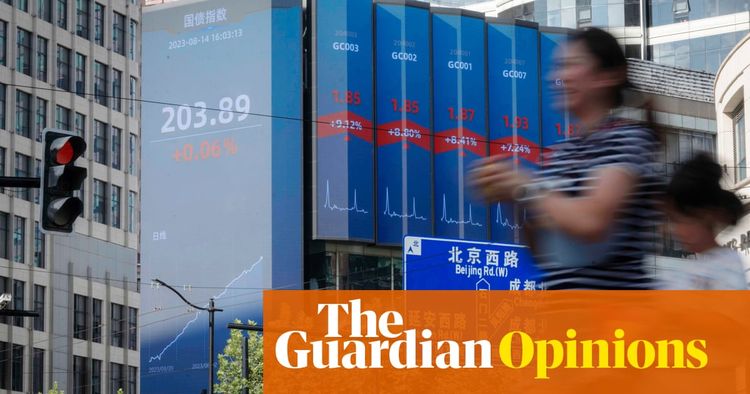China’s economic model is faltering – does it have the political will to fix it? | George Magnus

The extended days of summer seem to be excessively prolonged for the government in Beijing. In an effort to restore stability to the struggling real estate market, the officials recently declared a slight reduction in interest rates that was disappointingly small in both magnitude and purpose.
People who remember the difficult times when the western world faced many crises like Northern Rock, Bear Stearns, and Lehman Brothers will understand that reducing interest rates is not a solution to the underlying issues in real estate and finance. This is also the case in present-day China, where the government is struggling to stabilize an unsteady economy.
It is evident that the economic situation in China is struggling. The value of the yuan in comparison to other currencies is facing challenges, and despite strict regulations on the flow of money out of the country, individuals and businesses may still attempt to move their funds abroad. While it should be noted that stock prices are not strongly correlated with the overall state of the economy, they have reached their lowest point since the conclusion of 2022. This drop in stock prices reflects a lack of belief from Chinese households, investors, and private companies in an environment of deflation.
The main reason for this troublesome situation is the housing market. The number of transactions has significantly decreased and there seems to be an increasing decline in home prices. Recently, the property developer Evergrande, which is at the center of this crisis, has filed for bankruptcy protection in New York, Hong Kong, and the Cayman Islands. Along with Evergrande, many other companies in the industry are also facing a liquidity crisis. Another major company, Country Garden, which was previously seen as a great example of corporate responsibility, has now defaulted on some of its international bond obligations and is struggling to regain the trust of the market, with its stock value being very low.
China's current predicament is not due to its zero-Covid policies, nor is it a temporary issue that will disappear over time with the implementation of more relaxed policies. It is primarily rooted in the decline of the country's economic development model, marked by the bursting of the real estate bubble – the first of its kind since the transformation of a previous housing-welfare system into the largest and, for a period, the most significant property market globally.
The expansion started way before the Covid outbreak, and for numerous years the government supported it with lenient property rules and repeated cycles of substantial funding for building and infrastructure whenever the economy required a boost. With the assurance that the government constantly favored them, banks, households, and real estate developers acted financially as if property values and risky investments were always going to thrive.
However, as we discovered back in 2008, when the music ceases, all those involved act like a group, scrambling to exit. This is the current predicament that China finds itself in, compounded by unfavorable demographics. Prior to the pandemic, housing construction in China was operating at a rate approximately 30% higher than what could be justified based on projected decreases in household formation and the number of first-time buyers. Excessive construction and high vacancy rates plague numerous smaller towns and cities.
The housing industry is expected to shrink considerably from its current 23%-25% share of the economy, and the government can only attempt to control this decline, if feasible. With the significant decrease in transactions, there may be a chance for a temporary rebound if confidence returns, particularly if the government announces fiscal support for housing soon. However, in the long run, it seems unlikely that the situation will change, and if home prices keep falling, it could be difficult to prevent negative consequences. These consequences could include disruptions in property supply chains, such as in construction and materials, and could also impact banks and social stability.
As autumn approaches, China may attempt to revive the economy and there will be an upcoming significant gathering called the third plenum (of the 20th party congress), known for outlining crucial economic objectives. However, it is uncertain whether Xi's China possesses the political determination to tackle numerous issues that necessitate progressive or market reforms. These issues encompass alterations in the tax system, welfare programs, local government debt, political governance, productivity, and primarily, various methods of transferring income from the state to individuals and private companies to stimulate stronger consumption. Such actions do not align smoothly with the Leninist ideology followed by Xi's China, which is currently venturing into deep waters where the path is unfamiliar.









































